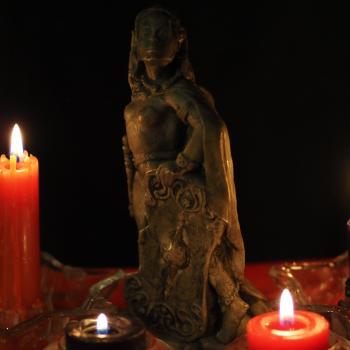Editors' Note: This article is part of the Patheos Public Square on the Future of Faith in America: Humanism. Read other perspectives here.
Humanists and other non-theists have spend a good number of years living in the shadows, exposed to badmouthing and blame for anything going wrong on the national level. No god, no moral code was the assumption made concerning humanists, and it went down hill from there.
That was the way things used to be, but the situation is changing. Humanism is gaining ground, and humanists are pushing into the future with a certain type of swag — moving with confidence while telling anyone who will listen that the United States is becoming a more reasonable place.
Mindful of these changing circumstances, humanists are preparing the "welcome table" for all the disillusioned theists who are looking for new homes that match their new philosophy of life. From "meet ups," to Sunday godless gatherings, to conferences and reading groups, there is a growing concern on the part of humanists to provide all the tools and resources necessary to integrate humanist values and principles into daily life.
The future is looking bright, but humanists shouldn't get cocky about victories won. While humanism will continue to grow, it will do so in a context marked by the ongoing claims and rituals of theism, although it will be a publically weaker theism with more "growl" than "bite," so to speak.
Of some comfort to humanists like me is the fact that theism's effort to fit the future, one marked by a growth in "nones," gives the strategic advantage to humanism. Theists will be on the defensive, backpedaling, and it's much harder to mount a good offense when moving backward. Only rigid Christians — those not concerned about the growth of their communities but only some odd sense of personal salvation — will dig in. And even progressive Christians will play into this loss of ground every time they respond to Christian misconduct with a "that's not my Christianity" comment. Such remarks reveal surrender to nostalgia and disillusionment.
Taken as a whole, perhaps this new situation allows for a less mocking tone when engaging theists (even as misguided as we may believe them to be)? The nasty and aggressive tone did some good work; it distanced humanists (and other non-theists) from theists and gained headlines and some visibility. But it also prevented some humanists from figuring out productive ways to engage with theists in a nation that remains theistic.
As humanism's influence grows, it remains the case that the type of large-scale transformation desired will require creative collaboration with progressive theists; and maximizing those partnerships will require searching for common ground. Humanists have some work to do in order to get to the point of fully appreciating and initiating those points of shared of concern and activity.
I understand humanists celebrating victories in the form of the growing appeal to a secularly framed private and public life, but moving forward a bit of introspection is necessary.
Like other humanists, I smile with every event or remark that supports a humanist agenda. I'm a humanist who believes humanism is a better life orientation option than theism — and I say this as a former minister. Yet, if humanism is going to offer something compelling and different on the socio-cultural level, for instance, it has to come to grips with its rather anemic response to issues of race, gender, sexuality, and class.
It would be a mistake for humanists to maintain the assumption that commitment to reason is a safeguard against participation in socio-cultural nonsense like racism, sexism, and so on. (Well, they may not say it, but responses to those who raise this point suggest shock and surprise guided by the assumption humanists are beyond the fray when it comes to social justice.) Humanism doesn't prevent people from behaving in stupid and destructive ways. But, unlike with theism(s), there are no cosmic justifications for messing up, and there are no supernatural forces pulling strings behind the scenes. Not having these unchallengeable safeguards makes it easier to confront and correct humanists' behavior: no "God told me to…" and no "well, the Bible says…" Still, having every action and pronouncement open to challenge and interrogation doesn't prevent destructive behaviors. It just makes it easier to recognize crap.
Moving forward humanists will need to acknowledge humanism's benefits and its shortcomings in practice. The growing population of non-theists should make this a bit easier. The increased numerical strength of humanism should make it less threatening to acknowledge shortcomings. The need to assume such confessions will derail humanists' efforts decreases as size of the humanist population increases. Yet, despite the possible downside, all this housekeeping is part of the work of a philosophy of life trying to maximize its growing popularity and offer its adherence strategies and tools for living in public.
8/19/2015 4:00:00 AM




